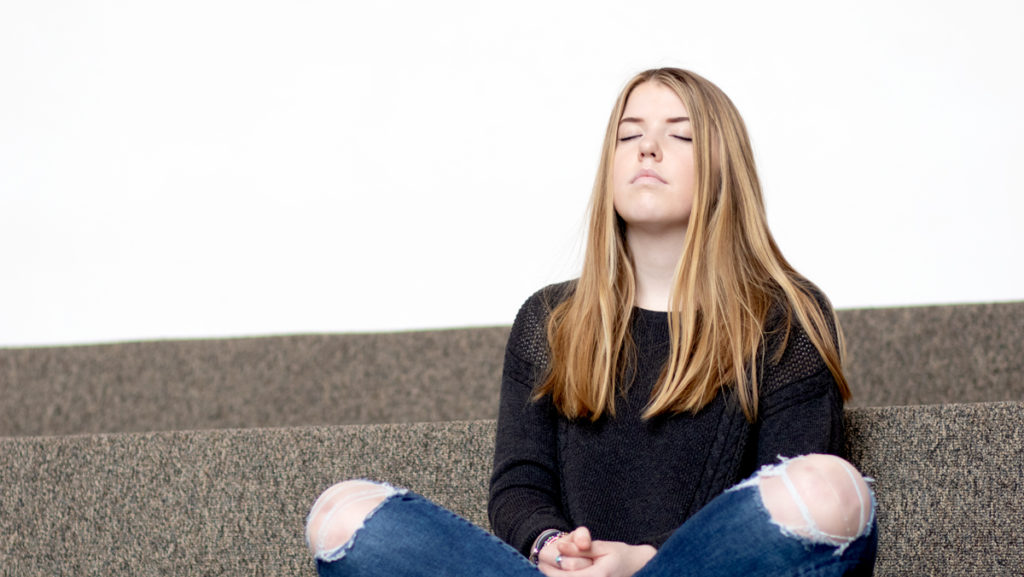On Mondays, Wednesdays and Fridays at noon, Muller Chapel hosts a temporary escape for the Ithaca College community.
Both students and faculty assemble in the chapel sanctuary equipped with their meditation pillows. Many sit cross-legged, others kneel and some lie down. Sometimes the sessions are silent, while other times an instructor provides guided meditations with helpful instructions for beginners. These instructions guide breathing, body or mind relaxation, and mindfulness of thought. The sessions are led by Mary Ann Erickson, associate professor in the Department of Gerontology, Julia Lapp, associate professor in the Department of Health Promotion and Physical Education, and Kathryn Caldwell, assistant professor in the Department of Psychology.
Erickson, Lapp and Caldwell began hosting these meditation sessions Fall 2017. Lapp and Caldwell had been doing mindfulness work in their classes after they attended the The Association for Contemplative Mind in Higher Education (ACMHE) national conference, where they got the idea to cross pedagogy with meditation.
“We went to the conference, we were really fueled by it and we wanted to do more,” Caldwell said. “Julia and I knew that Mary Ann had been doing contemplation in the classroom, so we reached out to her, and the three of us started this study group.”
Caldwell said she hopes that these meditation sessions can be a tool to bring the college community together through the shared values of achieving mindfulness and awareness.
The meditation sessions offered have no religious affiliation. Erickson said she hopes the use of the chapel for nondenominational meditation will expand the community it serves.
“When people think of the chapel, they associate it with religion. Hopefully, these meditation sessions can grow the use of the chapel,” Erickson said.
Erickson said she acknowledges that those who are new to meditation often stumble into it with the impression that it will always be easy and that a positive experience is more or less guaranteed. This is not always the case — meditation can be difficult.
“Meditation is not always as simple as ‘clearing your mind,’” Erickson said. “Meditation is also the process of observing your thoughts rise and fall, and those thoughts are not always pleasant. There are times when you may be restless or sleepy, which can make it difficult to stick with meditation.”
Erickson said she knows there are many barriers in meditation that beginners run into, like facing difficulty focusing and being alone with one’s thoughts. She said these difficulties make it vital for her to provide guidance and instruction.
“It can be difficult to begin meditation if you are alone, and providing a space to meditate with others can be helpful,” Erickson said.
Junior Melanie Sadoff regularly attends the chapel’s meditation sessions. She said many people face challenges when attempting mindfulness meditation.
“People are put off by it — just being you alone with your thoughts,” Sadoff said. “For me, at least, spending a lot of time alone can be draining. I think for a lot of people, it can be difficult to start and overcome that initial barrier.”
Sadoff said that her parents exposed her to meditation at a young age and that meditation has become essential to her daily morning routine.
“Even just today, I had a pretty tiring schedule. I had student teaching and jumping from activity to activity,” Sadoff said. “If I hadn’t gotten 10 minutes in the morning to center myself and say, ‘Okay, I can do this,’ I think it would be a very different day. Especially from my experiences with days when I think I don’t have time for meditation, and I go through my activities and I’m very, very thrown off, whether it’s memory, attention, focus or even passion.”
Senior Peony Lee said she occasionally attends the chapel’s open meditation sessions. She said she enjoys meditation as an opportunity to recenter herself.
“When I don’t meditate, I feel I can very easily be drawn into everything I’m doing in life, whether that’s like school or people or social media,” Lee said. “All those things in the world draw us outside of ourselves. It’s not often we get the opportunity to turn those things off and see what’s going on inside.”
Meditation may be uniting for many, but not everyone can reap the same benefits from meditation that others can.
“A lot of the time, I hear people say meditation is hard,” Caldwell said. “I think it’s because you are really trying to focus your attention where you want it, and it’s like an exercise. People go into meditation and quickly find that it’s quite difficult.”
Even while many find it hard, Sadoff said she thinks everyone should try meditation at least once, even though some may not be ready for meditation or the experiences that come along with it. Sadoff said she believes a common barrier for successful meditation is a person’s level of maturity.
“Meditation can be difficult if you’re someone who is material or worldly minded, and having the right mindset is often overlooked,” she said. “It’s super important because, externally, you want a great job or you want to travel, and there are all these things that are distracting you from that internal quietness that we look for when we meditate.”
Lee said that all of this is exemplified in a quote from Paramahansa Yogananda, former Indian yogi and guru: “By the practice of meditation you will find that you are carrying in your heart a portable paradise.”














